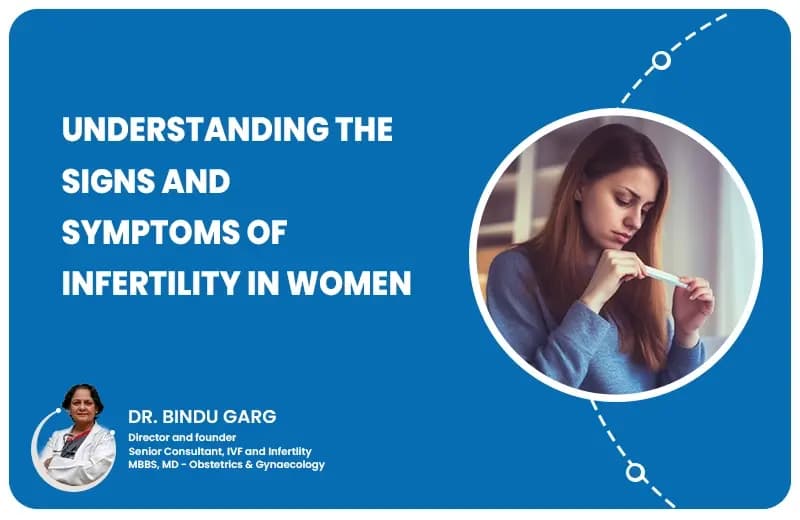
Understanding the Signs and Symptoms of Infertility in Women
Infertility is a challenge for many women today, and understanding its signs and symptoms is the first step toward seeking help and finding hope again. If you're struggling to conceive, you may feel isolated, confused, or frustrated.
This blog is meant to help you by highlighting the possible causes of infertility in women and the signs that may indicate you need medical attention. Whether you are experiencing hormonal imbalances, physical symptoms like pelvic pain, or age-related challenges, we provide information on how these factors affect your fertility.
Additionally, you will learn about diagnostic tests, treatment options, and lifestyle changes that can improve your chances of conceiving. Our goal is to empower you with knowledge, as well as acceptance of the emotional burden of the infertility journey.
By the end of this blog, you will be more informed and feel less alone, because you will know that there is help and solutions available to you.
Common Causes of Infertility in Women
Infertility in women can have many underlying causes, including:
- Ovulatory disorders: Problems with ovulation (the release of eggs from the ovaries) are a common cause of infertility. Conditions such as polycystic ovary syndrome (PCOS) and thyroid imbalances can disrupt ovulation.
- Blocked fallopian tubes: If the fallopian tubes are blocked or damaged, it can prevent an egg from being fertilized by sperm or make it difficult for a fertilized egg to travel to the uterus.
- Endometriosis: This condition occurs when tissue from the lining of the uterus begins to grow outside of it, causing pelvic pain and potential fertility problems.
- Uterine fibroids: Noncancerous growths in the uterus can affect implantation or increase the risk of miscarriage.
- Age: Women's fertility declines with age, especially after the age of 35, as both the quantity and quality of eggs decrease.
- Hormonal imbalances: Imbalances in hormones like FSH (follicle-stimulating hormone), LH (luteinizing hormone) and estrogen can affect ovulation and overall fertility.
Hormonal Symptoms Affecting Fertility
Hormonal problems are often the cause of infertility. Some of the major hormonal symptoms that affect fertility include:
- Irregular menstrual cycles: If your period is irregular or doesn’t come, it could be a sign of an ovulation problem or a hormone imbalance.
- Excess hair growth: Excessive hair on the face or body, especially in areas like the chin or chest, can be a sign of PCOS, which affects hormone levels.
- Acne and oily skin: High levels of androgens (male hormones) can lead to acne and skin problems, which are often seen in conditions like PCOS.
- Changes in cervical mucus: If cervical mucus is too thick or absent, it may be more difficult for sperm to reach the egg.
Physical Symptoms That May Signal Infertility
Certain physical symptoms may indicate underlying infertility problems, such as:
- Pelvic pain or cramping: Painful periods or pelvic pain other than menstruation can be a sign of conditions such as endometriosis, fibroids or pelvic inflammatory disease (PID).
- Pain during intercourse: Painful sex can be a sign of endometriosis or other pelvic health problems that can affect fertility.
- Abnormal bleeding: Irregular or heavy menstrual periods, or bleeding between cycles, may be a sign of fibroids, polyps, or hormonal imbalances.
Lifestyle and Environmental Factors
Lifestyle choices and environmental exposures can also contribute to infertility:
- Smoking: Smoking can reduce fertility by affecting egg quality, causing hormonal imbalances, and damaging the fallopian tubes.
- Alcohol consumption: Excessive alcohol consumption can interfere with ovulation and harm reproductive health.
- Obesity or underweight: Both being overweight and underweight can disrupt hormonal balance, affecting ovulation and fertility.
- Environmental toxins: Exposure to chemicals, pesticides or industrial pollution can also impact fertility by affecting hormone levels or egg quality.
Signs That You Can’t Get Pregnant
Age as a Factor in Female Infertility
Age is one of the most important factors affecting a woman's fertility. As women age, especially after the age of 35, their chances of conceiving decrease due to a decrease in the number and quality of eggs. Some age-related fertility signs include:
- Irregular or skipped periods: As women approach perimenopause (the transition toward menopause), their menstrual cycles can become less predictable.
- Reduced ovarian reserve: Women may have fewer eggs available for fertilization, making pregnancy more difficult.
- Increased risk of miscarriage: Older women have a higher risk of miscarriage due to chromosomal abnormalities in the eggs.
Unexplained Weight Changes and Fertility
Unexplained changes in weight can affect fertility by affecting hormone levels. Excess weight, especially belly fat, can cause insulin resistance, which can interfere with ovulation. On the other hand, being underweight can disrupt the production of reproductive hormones and lead to irregular menstrual cycles.
Signs of Ovulation Problems
Problems with ovulation can affect fertility. Some common symptoms of ovulation dysfunction are:
- Infrequent or absent periods: If you have a longer menstrual cycle or no period at all, it could be a sign that ovulation is not occurring.
- Short luteal phase: The luteal phase is the time between ovulation and the start of the next menstrual period. If this phase is too short, it can prevent the successful implantation of a fertilized egg.
- Changes in cervical mucus: The consistency and amount of cervical mucus changes during the menstrual cycle. If you notice little or no cervical mucus or the mucus is not fertile (i.e., thick and sticky), this could be a sign of ovulation problems.
Diagnosing Infertility in Women
Tests and Procedures for Infertility
There are several tests and procedures that can help identify the causes of infertility in women:
- Blood tests: Blood tests can measure hormone levels, including FSH, LH, estrogen, and thyroid hormones, which can help detect hormonal imbalances.
- Pelvic ultrasound: This imaging test can check for conditions such as fibroids, ovarian cysts, and polyps, which can affect fertility.
- Hysterosalpingography (HSG): This is an X-ray procedure that evaluates the size of the uterus and checks for blockages or scarring in the fallopian tubes.
- Laparoscopy: This is a minimally invasive surgery that allows doctors to inspect the pelvic organs for problems such as endometriosis or adhesions.
When to Consult a Doctor
It is advisable to visit a doctor if:
- You have been trying to conceive for more than a year without success (more than six months if you are over 35).
- You experience symptoms such as irregular menstrual periods, severe pelvic pain, or unexplained weight changes.
- You have a history of problems like PCOS, endometriosis or pelvic infections.
- If you're over 35 and trying to conceive – early intervention can increase the chances of success.
Psychological Symptoms and Infertility
Infertility can be very emotionally damaging. Some of the psychological effects are:
- Stress and anxiety: Worrying about your ability to conceive or undergoing fertility treatment can cause a lot of stress.
- Depression: The emotional stress caused by infertility can lead to feelings of sadness or despair.
- Grief and loss: Women struggling with infertility may experience a sense of loss, especially if they have been trying for a long time.
Treatment Options and Support
Medical Treatments for Infertility
There are several medical options available to treat infertility, depending on the underlying cause:
- Ovulation induction: Medications such as Clomid or Letrozole can help stimulate ovulation in women who do not ovulate regularly.
- Intrauterine insemination (IUI): In this procedure, sperm is inserted directly into the uterus during ovulation to increase the chances of fertilization.
- In vitro fertilization (IVF): In IVF, the egg is fertilized outside the body and then the embryo is implanted in the uterus.
- Surgery: In some cases, surgery may be needed to remove fibroids, treat endometriosis, or repair blocked fallopian tubes.
Lifestyle Changes to Improve Fertility
Making healthy lifestyle changes can improve fertility and overall reproductive health:
- Diet: Eating a balanced, nutrient-rich diet that includes plenty of fruits, vegetables, and whole grains helps improve hormone balance and egg quality.
- Exercise: Regular moderate exercise can help maintain a healthy weight, regulate hormones, and improve overall health.
- Stress management: Reducing stress through yoga, meditation, or therapy can help improve fertility by balancing hormone levels.
Emotional Support for Women Facing Infertility
Infertility can be emotionally challenging, so it's important to get emotional support. This may include:
- Counselling or therapy: Talking to a doctor who specializes in reproductive health or infertility can help manage the emotional impact.
- Support groups: Joining support groups (in person or online) where you can share experiences with others facing similar challenges can provide a sense of community.
Frequently Asked Questions (FAQs)
Q1. Can irregular periods cause infertility?
Yes, irregular periods can be a sign of hormonal imbalance, which can interfere with ovulation and make conceiving more challenging.
Q2. Is infertility only caused by age?
No, infertility can be caused by many reasons, including hormonal imbalances, lifestyle, medical conditions, and environmental factors. Age is just one aspect of fertility.
Q3. How common is infertility among women?
Infertility affects approximately 10–15% of couples, with female infertility accounting for approximately one-third of cases.
Q4. What lifestyle changes can help improve fertility?
Eating a balanced diet, exercising regularly, reducing alcohol and caffeine intake, and avoiding smoking can help improve fertility.
Q5. Can stress lead to infertility in women?
Although stress alone does not cause infertility, it can contribute to hormonal imbalances, which can affect reproductive health. Managing stress is beneficial for overall health.
Q6. How does being overweight affect fertility?
Being overweight can lead to hormonal imbalances and conditions like PCOS, which can interfere with ovulation. Maintaining a healthy weight can improve fertility.
Conclusion
In conclusion, recognizing the signs and symptoms of infertility is the first important step toward getting the help you need. Although the journey can be challenging, medical advancements and lifestyle changes offer hope for those seeking to start a family. Consulting a specialist like Dr. Bindu Garg can provide personalized guidance and treatment to help you on this path. Don't hesitate to seek support, both medically and emotionally, as you embark on the path to becoming a parent.
Content Created By:

CyberBizz Technologies
Team - Content Curator